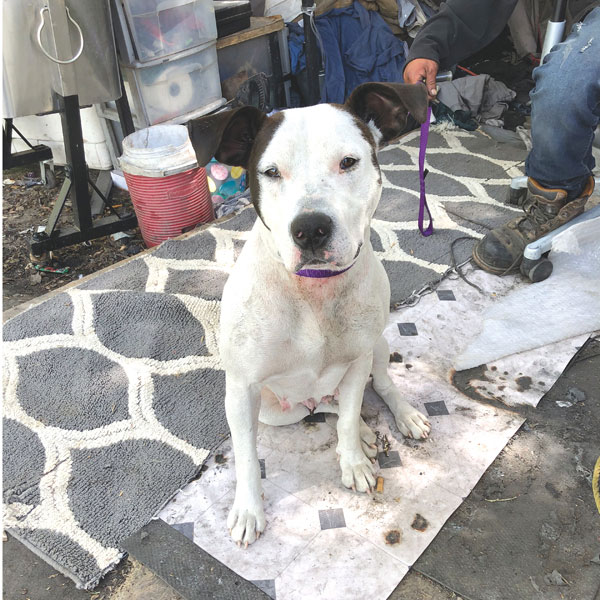Sacramento is not “no-kill.”
In 2022, the city’s Front Steet Animal Shelter killed 747 dogs and cats. The county’s Bradshaw Animal Shelter killed 738.
By mid-July this year, Front Street killed 547 animals, more than 150 over last year’s pace.
The majority of animals were euthanized because they were too old, too aggressive, too fearful at the shelter—and there are just too many.
Front Street Animal Shelter took in 6,306 stray dogs and cats last year. Bradshaw Animal Shelter took in 7,380. Intakes are up. Adoptions are down. Shelters are over capacity.
Where are all these animals coming from?

I recently met with Dr. Clyde Sharikova-Sudarma, a veterinarian with Elica Health Centers. I joined the doctor at a homeless camp in North Sacramento. Elica provides health care services to low-income people and began a veterinary outreach program in 2016.
Working out of a white Ford Explorer, Sharikova-Sudarma offers free vaccinations, microchips, flea prevention, pet food, collars, leashes and other supplies to pets of the unhoused. The one thing he can’t offer is spay and neuter surgeries.
Louis lives in one of six tents at the North Sacramento encampment. His 1-year-old pit bull mix, Sally, already had one litter of puppies, which Louis sold to passersby. “I wanted her to experience motherhood,” he says.
Several people sought Elica’s services that day. Most dogs were under 1 year old. One woman asked the vet about getting her puppy spayed. Sharikova-Sudarma instructed her to visit the Front Street website to schedule an appointment.
There’s nothing on the Front Street home page about spay/neuter. Buried deeper is a page with information on a low-cost spay/neuter program for people who live in the city and meet income requirements.
But it’s almost impossible to get an appointment. For cats, the website says, “Both of our partner organizations have backlogs, and you probably won’t get an appointment right away. Keep trying!”
For dogs, the first clinic says, “Unfortunately, there are no appointments available at this time. You are welcome to check back as often as you like for new openings.” The second clinic says, “Current wait time to schedule an appointment after waitlist submission is 3–4 months.”
None of that helps homeless people. It barely helps residents.
Dr. Sharikova-Sudarma also coordinates spay/neuter services with Front Street’s Homeless Outreach and Assistance Program. “It makes it a lot easier to communicate than to have people access the internet, sign up or visit a hospital shelter,” he says.
Does that system work? From May 2022 to January 2023—nine months—Front Street spayed and neutered 43 animals owned by homeless people.
The average number of puppies per litter is six. There are about 10,000 homeless people in Sacramento. They have hundreds of dogs creating thousands of puppies. Unaltered cats add thousands more.
It’s no wonder Sacramento’s two municipal animal shelters took in 13,686 strays last year. The system is failing. Breeding is out of control.
State law requires animal shelters and rescue groups to spay or neuter pets prior to adoption. But no law exists to prevent your neighbor or a homeless guy from breeding his animal.
Debbie Tillotson visits homeless camps off of Highway 160 to feed and care for dogs. She sees breeding firsthand. “The whole purpose is to sell the puppies for drugs or alcohol or money,” she says. “If you’re going to stop all these puppies and dogs from going into Front Street, you have to get them fixed.”
So, why isn’t spay/neuter mandatory in Sacramento?
Sacramento shelter leaders cite the nationwide vet shortage. But other cities find ways.
Riverside County requires dogs and cats to be spay/neutered. San Francisco prohibits the breeding of pit bulls without a $100 permit fee. Pet owners in North Central Los Angeles with intact animals must pay a $100 license fee and $235 breeding permit. Long Beach has a mandatory spay/neuter ordinance. Individuals who want to breed their dog must apply for a $5,000 breeding permit.
It’s time for Sacramento to step up and stop the breeding.
Cathryn Rakich can be reached at crakich@surewest.net. Follow us on Facebook, Twitter and Instagram: @insidesacramento.















